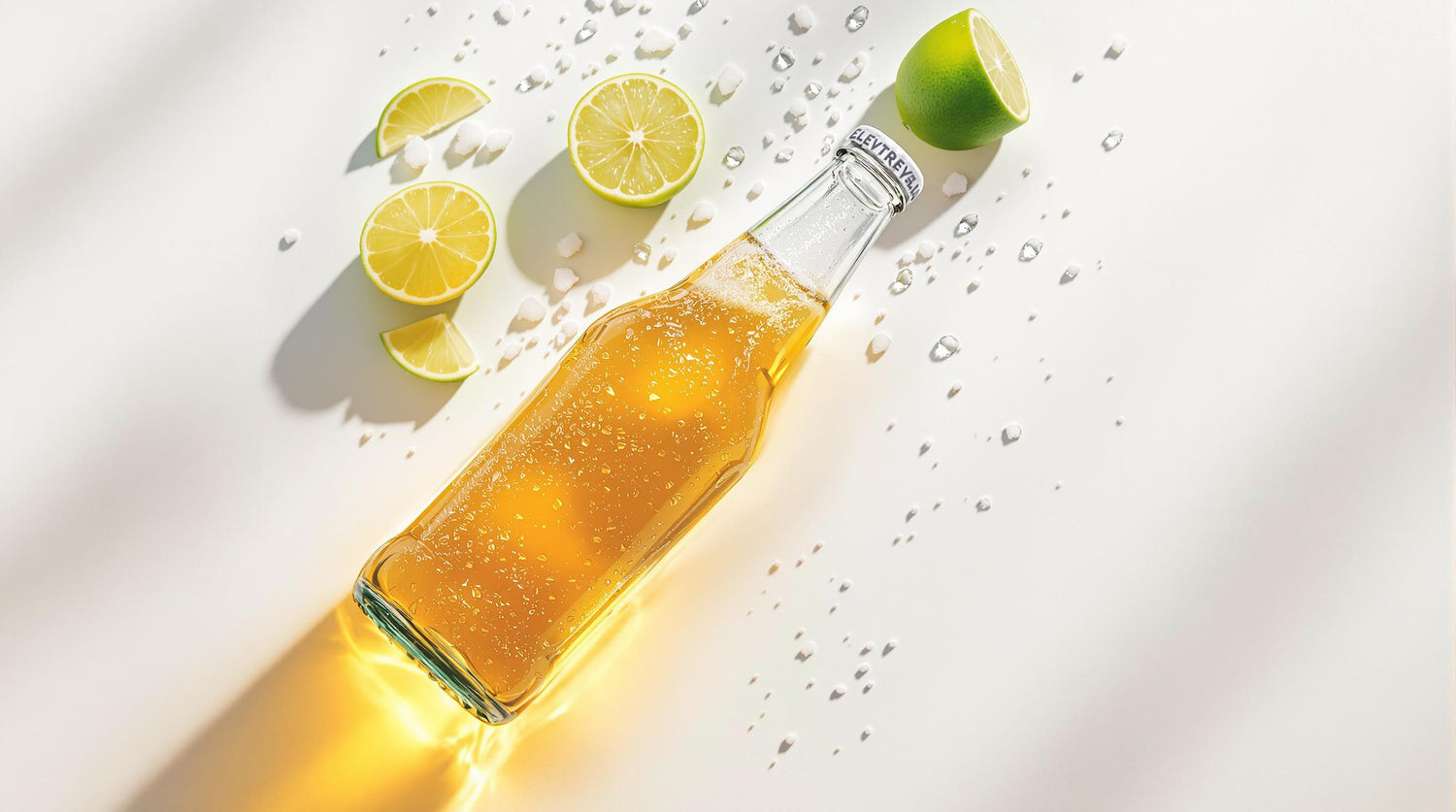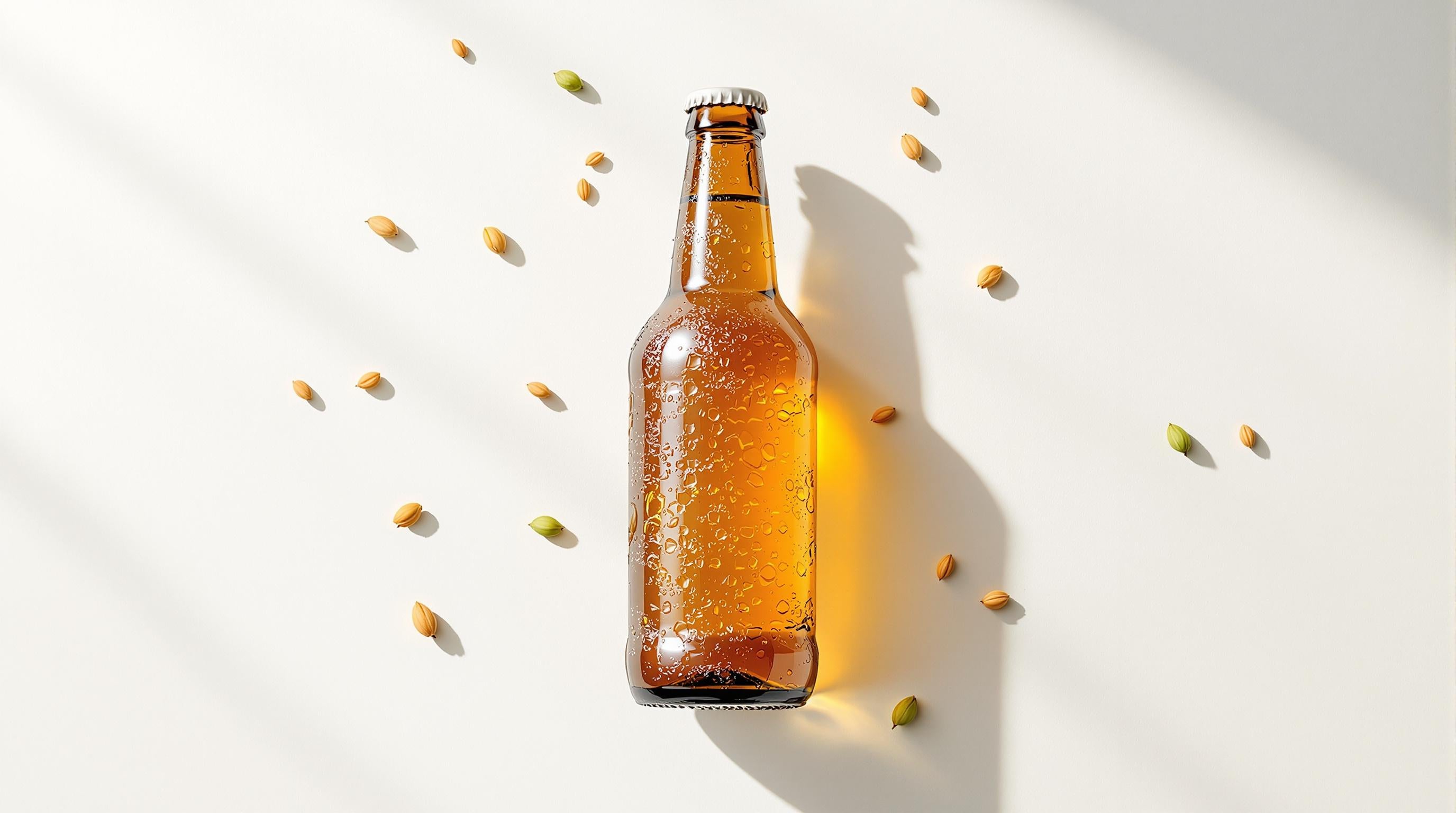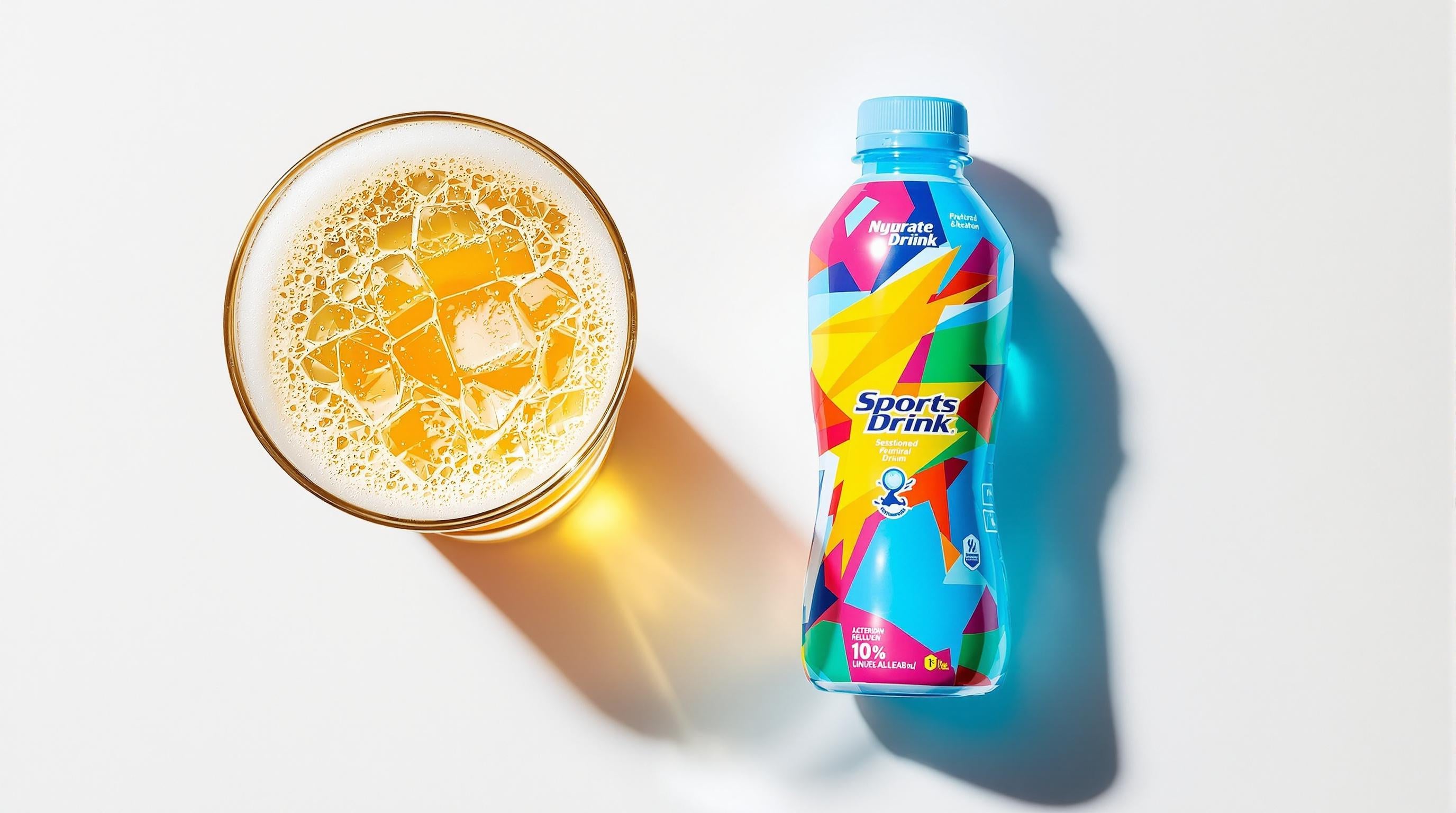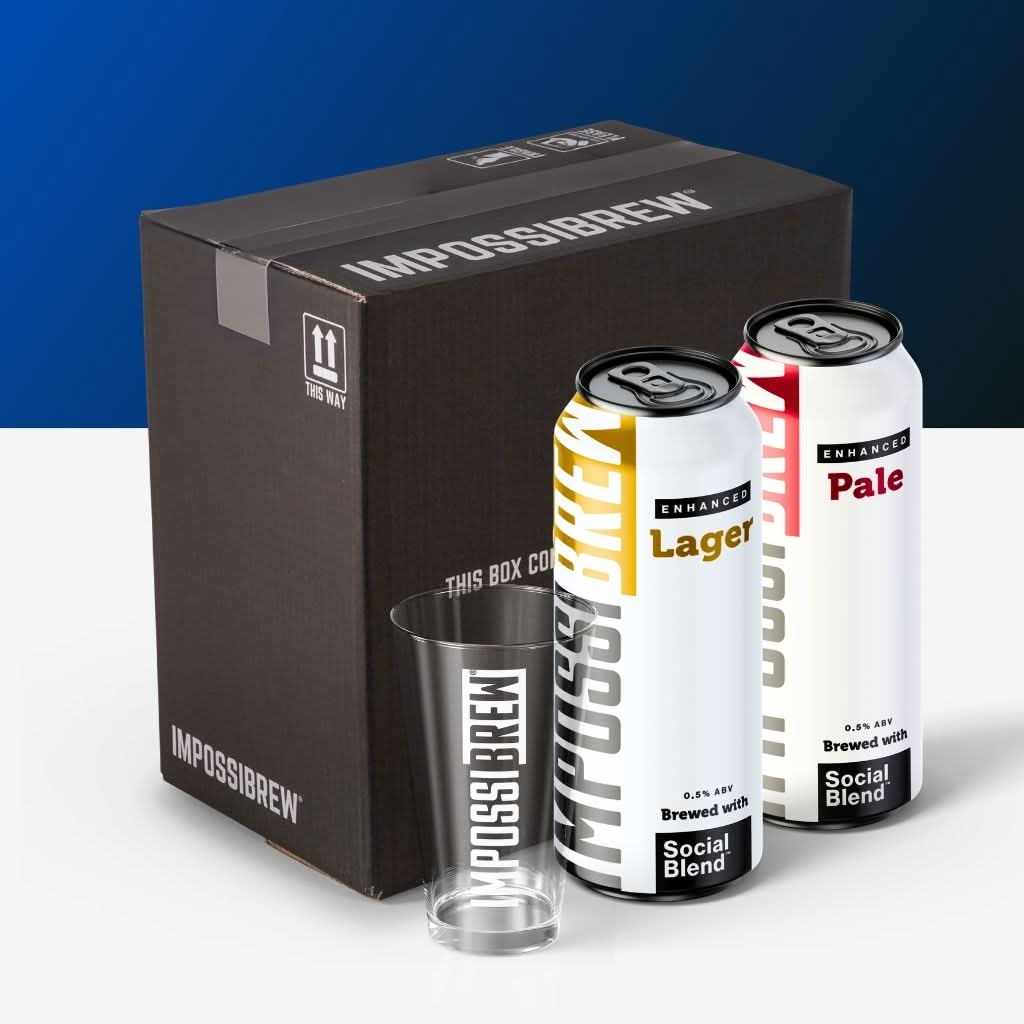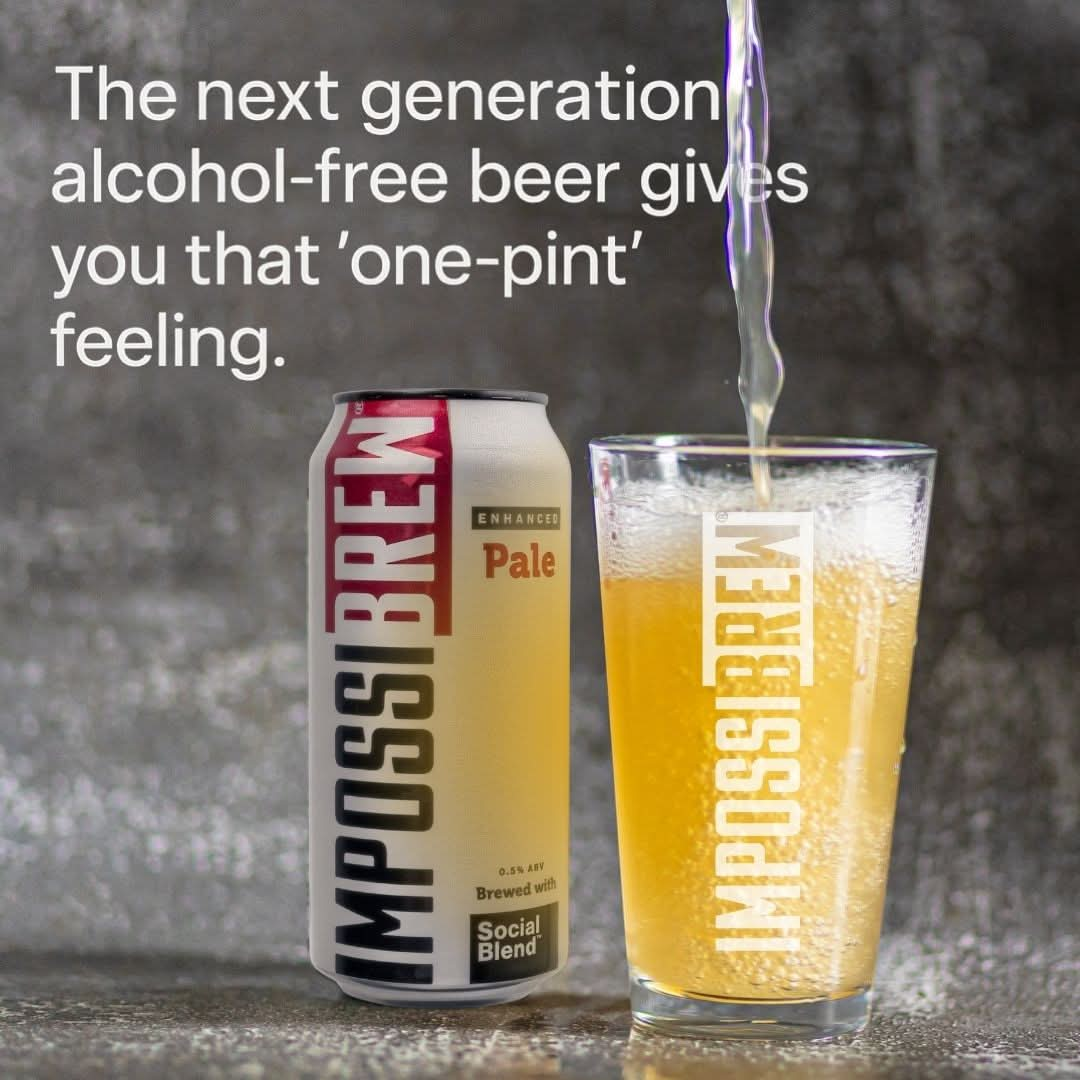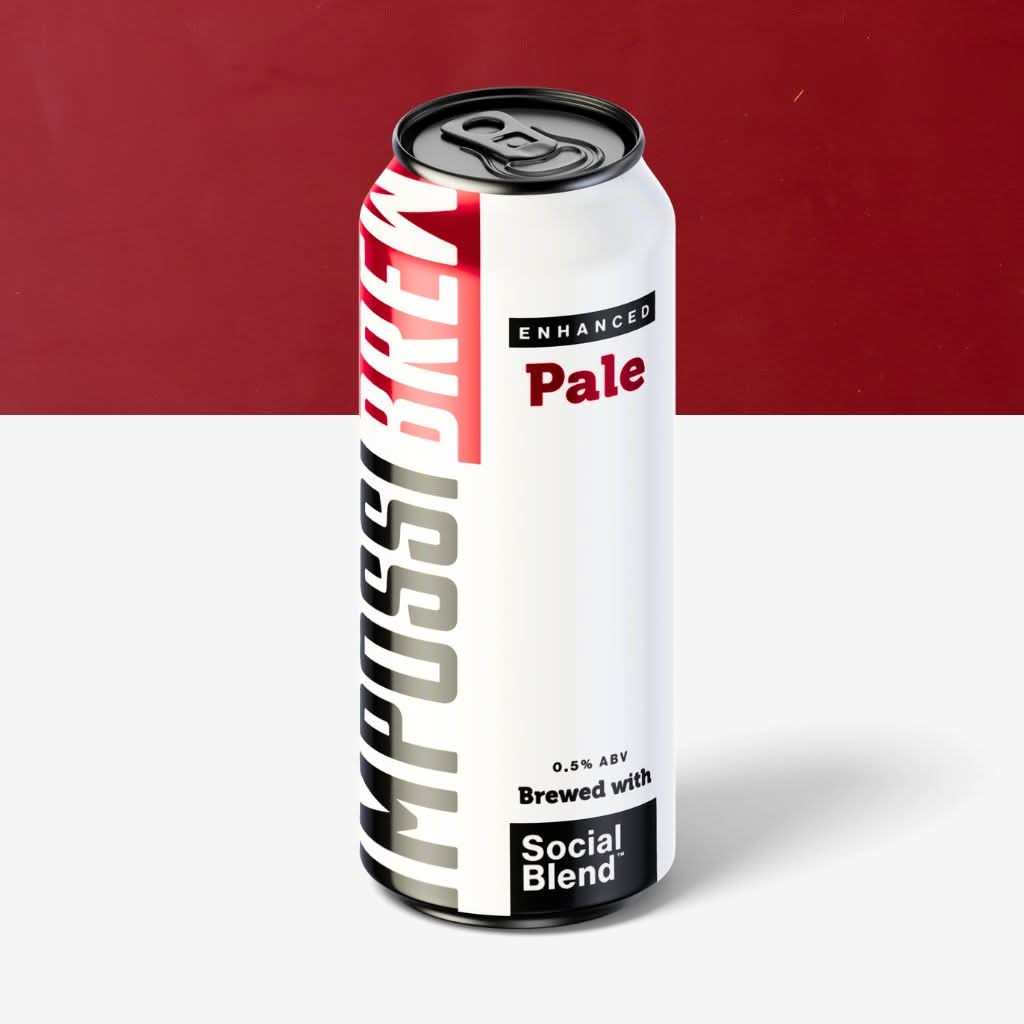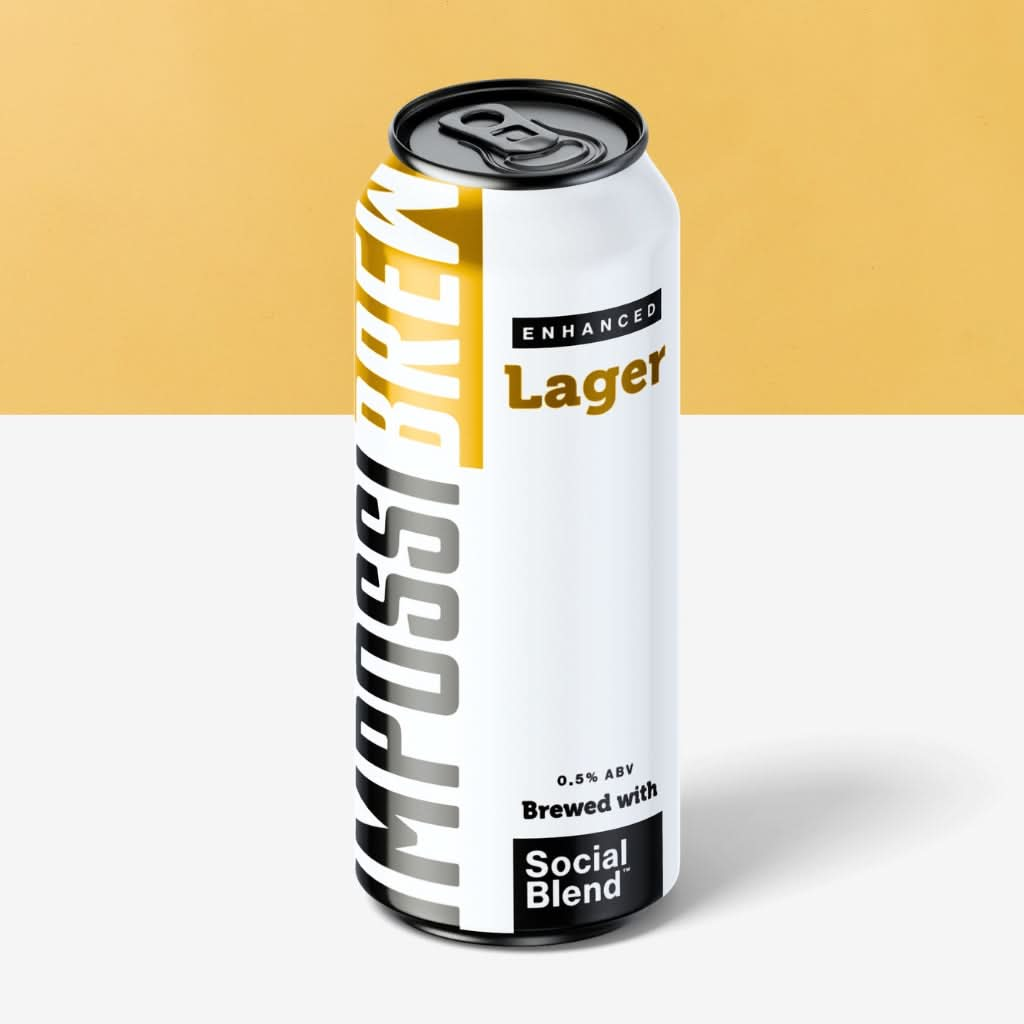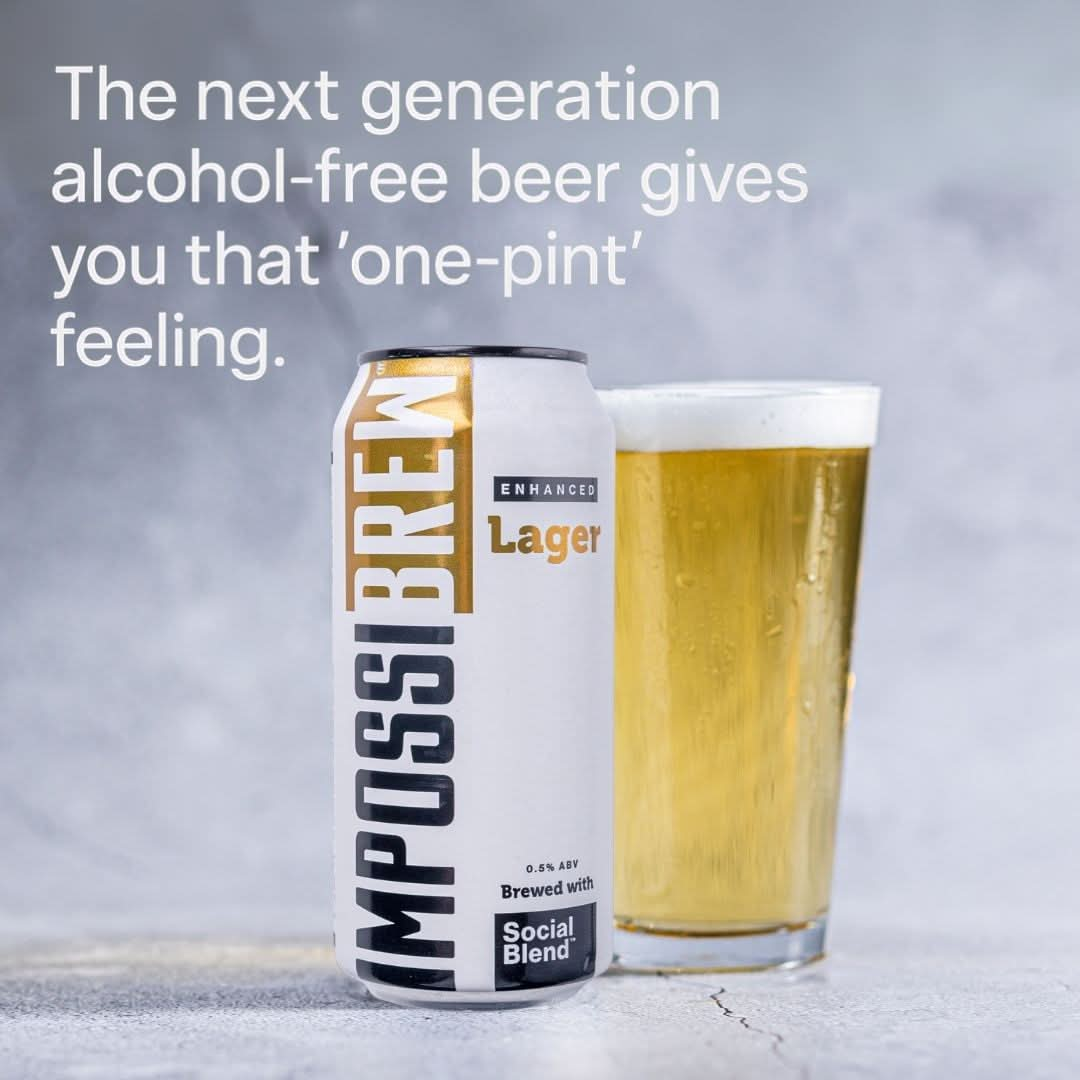Yes, non-alcoholic beer can aid hydration, especially after exercise, thanks to its electrolytes and isotonic properties. Here's why:
- Electrolytes: It contains minerals like sodium, potassium, magnesium, and calcium that help restore hydration and support muscle recovery.
- Isotonic Composition: Its balance of fluids and nutrients is similar to the body's natural fluids, making it easy to absorb.
- Carbohydrates: Non-alcoholic beer often includes carbs (1.9-3.2%) that improve electrolyte absorption and provide energy.
Quick Comparison: Non-Alcoholic Beer vs. Sports Drinks
| Feature | Non-Alcoholic Beer | Sports Drinks |
|---|---|---|
| Sodium Content | Lower | Higher |
| Potassium Content | Higher | Lower |
| Carbohydrates | 1.9-3.2% (optimal) | 3-4% (optimal) |
| Hydration Effectiveness | Moderate | High |
| Additional Benefits | Polyphenols for recovery | B vitamins |
Non-alcoholic beer works well for post-exercise recovery, especially when combined with salty snacks to boost sodium intake. While it doesn't completely replace sports drinks, it's a refreshing, alcohol-free option for hydration and recovery.
Why non-alcoholic beer is better after exercise, study shows
Understanding Electrolytes and Their Importance
Electrolytes are minerals with an electric charge that play a key role in hydration and keeping cells working properly. These minerals - like sodium, potassium, magnesium, calcium, and chloride - help your body stay hydrated and maintain essential cellular processes [1].
Functions of Electrolytes in the Body
Each electrolyte has a specific job. Sodium helps balance water levels and supports nerve and muscle function. Potassium is crucial for maintaining heart rhythm and muscle contractions. Magnesium contributes to energy production and muscle recovery. Together, these minerals ensure the body maintains the right water balance across cells, tissues, and organs [1] [2].
| Electrolyte | Key Functions | Role in Hydration |
|---|---|---|
| Sodium | Regulates water levels, supports nerve activity | Helps balance fluids |
| Potassium | Supports heart rhythm, aids muscle function | Improves hydration at the cellular level |
| Magnesium | Boosts energy production, aids recovery | Helps retain fluids |
Electrolyte Loss and the Need for Replacement
When you sweat during exercise, you lose electrolytes, which can impact your performance and recovery. Replenishing these minerals is essential to keep your body functioning well during and after physical activity [1] [2].
Interestingly, some non-alcoholic beers, like Zero+ Sports Beer and Athletic Brewing Company’s offerings, are designed with balanced amounts of sodium and potassium. Their isotonic properties make it easier for the body to absorb both water and electrolytes efficiently [2] [3].
Understanding how electrolytes function is critical for appreciating the hydration benefits of non-alcoholic beer.
Electrolytes in Non-Alcoholic Beer for Hydration
Electrolyte Levels in Non-Alcoholic Beer
Non-alcoholic beer naturally contains electrolytes, which play a role in hydration. However, the levels of these minerals can vary by brand. For example, Zero+ Sports Beer provides 71mg of sodium and 113mg of potassium per 375mL. On the other hand, Athletic Brewing Co. offers 11.3-15mg of sodium and 125mg of potassium per serving. While these numbers are a good start, they don't meet the ideal range for hydration drinks: 180-225mg of sodium and 60-75mg of potassium per serving [1].
To bridge this gap, some brands are creating non-alcoholic beers specifically designed with hydration in mind. These products aim to compete with traditional sports drinks by offering a more functional alternative.
| Brand | Sodium Content | Potassium Content | Carbohydrates |
|---|---|---|---|
| Zero+ Sports Beer | 71mg/375mL | 113mg/375mL | Not specified |
| Athletic Brewing Co. | 11.3-15mg/serving | 125mg/serving | 11.5-14g/serving |
| Ideal Hydration Beverage | 180-225mg/serving | 60-75mg/serving | 3-4% solution |
In addition to their electrolyte content, non-alcoholic beers provide hydration benefits through how they're absorbed by the body.
Mechanisms of Hydration with Non-Alcoholic Beer
The isotonic nature of non-alcoholic beer allows the body to absorb water and electrolytes efficiently [2]. This makes it a practical choice for hydration. Electrolytes combined with carbohydrates in these beers work together to improve hydration effectiveness.
For instance, Athletic Brewing Company's products contain 11.5-14g of carbohydrates per serving. This falls within the recommended 3-4% carbohydrate solution range, which is ideal for hydration [1]. These carbohydrates not only help with electrolyte absorption but also provide a quick energy boost during physical activity.
Unlike regular beer, non-alcoholic options don't act as diuretics. This makes them better at maintaining hydration levels over time [1][3].
Research on Non-Alcoholic Beer and Hydration
Studies on Hydration Effects
Recent studies have shown that non-alcoholic beer can be a helpful option for hydration. Dr. Ben Desbrow's research points out that electrolyte-enhanced non-alcoholic beers are better at rehydrating the body than alcoholic beverages [3].
Thanks to its isotonic properties, non-alcoholic beer works well for fluid replenishment. Its composition is similar to low-sugar sports drinks, allowing the body to absorb fluids efficiently [2]. Beyond general hydration, it can play a role in aiding recovery after physical activity.
Athletic and Post-Workout Hydration
Staying hydrated is essential for athletes, both during and after exercise, and non-alcoholic beer offers a practical option for recovery. With carbohydrates (ranging from 1.9% to 3.2%) and electrolytes like sodium and potassium, it supports rehydration and recovery [1].
Dietitian Ashley Thomas suggests combining non-alcoholic beer with salty meals to increase electrolyte intake [1]. This is particularly useful because non-alcoholic beer tends to have less sodium than most sports drinks.
| Recovery Strategy Component | Purpose | Recommendation |
|---|---|---|
| Non-Alcoholic Beer | Main hydration source | Drink after exercise |
| Salty Meal | Extra sodium intake | Pair with the beverage |
| Timing | Best absorption | Within 30 minutes post-workout |
While more research is needed to directly compare non-alcoholic beer to sports drinks [3], its potential as a recovery drink, especially for endurance athletes, is gaining attention and driving further studies.
sbb-itb-a752bf8
Non-Alcoholic Beer vs. Sports Drinks for Hydration
Pros and Cons of Each
When it comes to hydration, both non-alcoholic beer and sports drinks have their strengths and weaknesses. Non-alcoholic beer has a refreshing, familiar taste that can encourage people to stay hydrated [1]. Its naturally isotonic composition - meaning its concentration is similar to that of human blood - makes it effective for fluid absorption [2].
However, non-alcoholic beer tends to have less sodium compared to sports drinks, so pairing it with salty snacks can help balance electrolytes [1]. On the other hand, sports drinks are specifically designed to maintain steady electrolyte and carbohydrate levels, making them a solid choice for hydration. The downside? They often have more sugar and calories, which might not suit everyone.
Comparison Chart
Here’s a breakdown of how non-alcoholic beer and sports drinks compare in key areas:
| Component | Non-Alcoholic Beer | Sports Drinks | Impact on Hydration |
|---|---|---|---|
| Sodium Content | Lower | Higher | Sports drinks are better for electrolyte balance |
| Carbohydrates | Within optimal range | Within optimal range | Both support hydration and energy replenishment |
| Potassium | Higher levels | Lower levels | Non-alcoholic beer enhances cellular hydration |
| Isotonic Properties | Naturally isotonic | Specifically formulated | Both promote efficient fluid absorption |
| Additional Benefits | Includes polyphenols for immune support | Often enriched with B vitamins | Different but complementary advantages |
Non-alcoholic beer, with its carbohydrate content (1.9-3.2%) and isotonic properties, is a good option for hydration and energy recovery [1][2]. For athletes or those engaged in intense physical activity, the choice depends on the context. Sports drinks are better during high-intensity workouts when quick sodium replacement is needed. Non-alcoholic beer, especially when paired with salty foods, works well for post-exercise recovery [1].
While sports drinks are excellent for immediate sodium replenishment, non-alcoholic beer offers a distinct set of benefits that make it a strong contender for hydration and recovery [1][2].
Functional Non-Alcoholic Beers and IMPOSSIBREW®
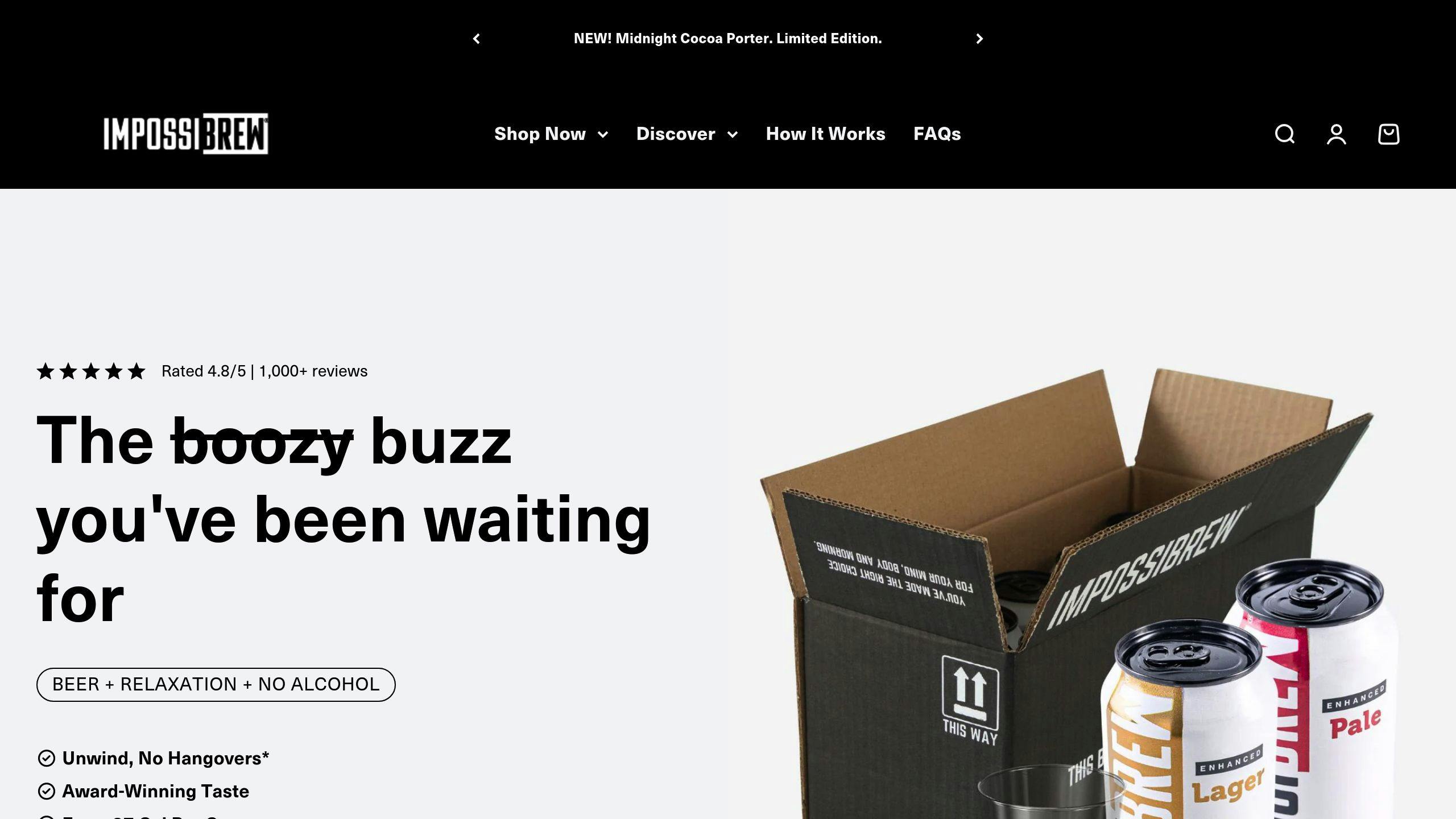
Functional non-alcoholic beers are changing the game by combining science-backed ingredients with modern brewing methods. IMPOSSIBREW® is a standout example, offering drinks that blend hydration benefits with ingredients aimed at recovery and relaxation.
IMPOSSIBREW® and Social Blend™
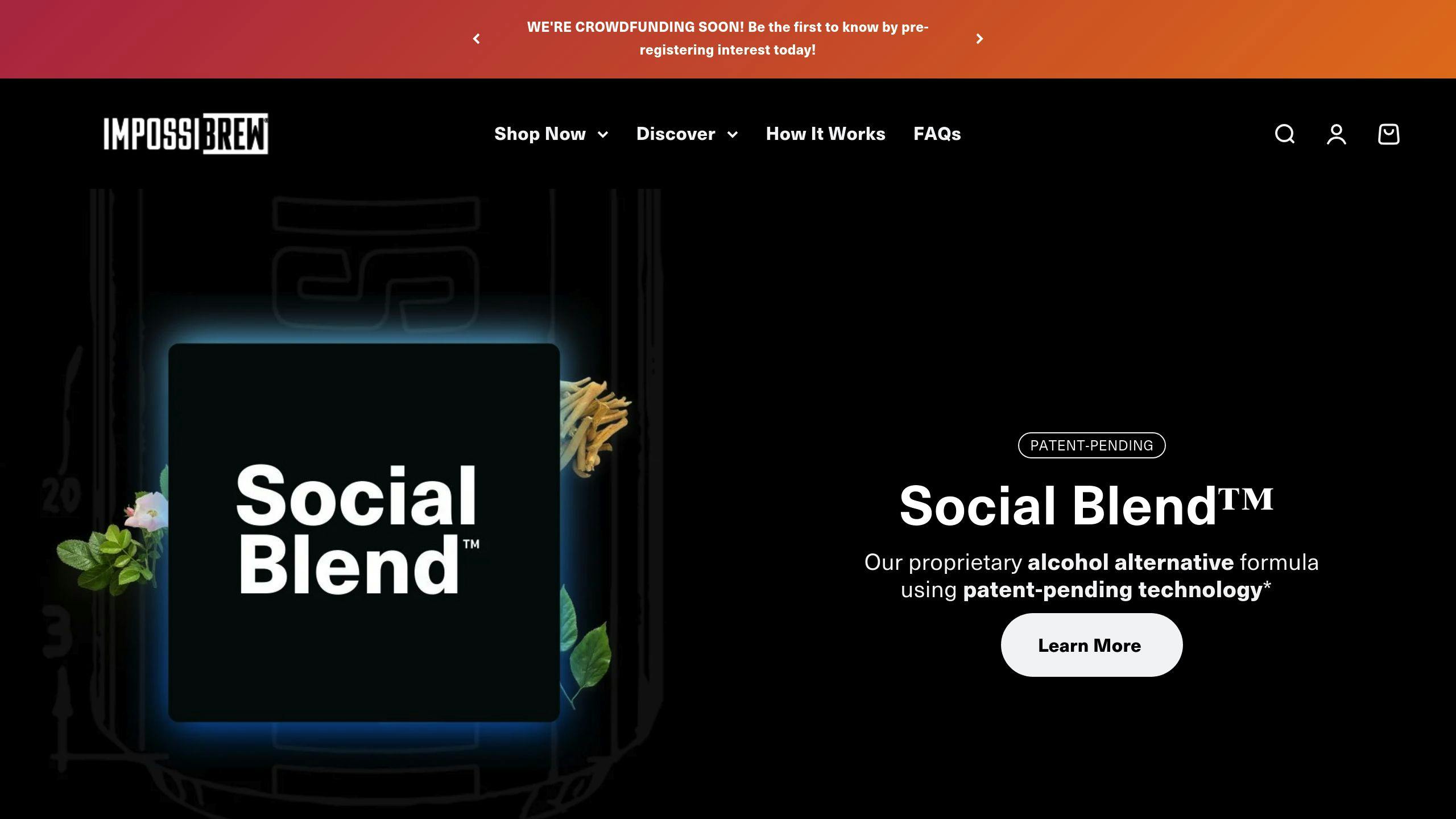
IMPOSSIBREW®'s Social Blend™ is crafted to deliver hydration alongside a calming sensory experience. These drinks are designed with compounds that not only help with hydration but also aid in recovery, making them a great choice for rehydrating after exercise [1] [2].
Features of IMPOSSIBREW® Beers
IMPOSSIBREW®'s lineup includes Enhanced Lager and Hazy Pale, both designed to hydrate effectively while catering to various dietary needs. These beverages combine the hydration benefits of traditional non-alcoholic beers with added functional elements through their unique brewing process [1] [2].
Key hydration features include:
- Isotonic properties for better fluid absorption
- Balanced electrolytes
- Natural minerals that aid recovery
- Low-calorie content
These drinks offer a refreshing alternative to sports drinks, meeting hydration and recovery needs while delivering the familiar taste of beer. Paired with the right sodium intake, they provide solid support for post-exercise recovery [1] [2].
Conclusion: Non-Alcoholic Beer as a Hydration Aid
Research shows that non-alcoholic beer can be a helpful option for hydration, especially after exercise. Thanks to its electrolyte content, it supports fluid balance and recovery effectively.
Isotonic non-alcoholic beers, which contain the right balance of electrolytes, are particularly useful for post-workout recovery [2]. Here's a quick look at the ideal composition for hydration:
| Component | Recommended Amount per Serving |
|---|---|
| Carbohydrates | 3-4% solution |
| Sodium | 180-225 mg |
| Potassium | 60-75 mg |
Brands like IMPOSSIBREW® are leading the way by blending science with brewing to create beverages that support hydration and recovery goals [1][2]. These drinks provide an alcohol-free option for staying hydrated while offering functional benefits.
While non-alcoholic beers may not exactly match the electrolyte levels found in sports drinks, they are a refreshing alternative. They combine hydration support with the added bonus of being socially acceptable, making them a practical choice for casual drinkers.
With ongoing research into electrolyte levels and brewing techniques, we can expect even more progress in hydration-focused non-alcoholic beverages in the near future.
FAQs
Does non-alcoholic beer have electrolytes?
Yes, non-alcoholic beer contains electrolytes like sodium, potassium, calcium, and magnesium [1]. The exact levels depend on the brand, with some offering formulas aimed at improving hydration. This ties back to the earlier discussion about its isotonic properties. For better sodium replenishment, try pairing non-alcoholic beer with a salty snack or meal [1].
Is non-alcoholic beer more hydrating than water?
Non-alcoholic beer provides hydration similar to water but isn't as effective as sports drinks [1][3]. Its isotonic makeup, combined with electrolytes and carbohydrates, supports rehydration [2].
Here’s a quick comparison of hydration effectiveness:
| Beverage Type | Hydration Level | Key Features |
|---|---|---|
| Sports Drinks | High | Balanced electrolytes, designed for recovery |
| Non-Alcoholic Beer | Moderate | Includes electrolytes and carbs, isotonic |
| Water | Moderate | Basic hydration, no added nutrients |
The trace amounts of alcohol (below 1.15% ABV) in non-alcoholic beer don’t interfere with hydration, making it a refreshing option for post-workout recovery [1][2].
This demonstrates how non-alcoholic beer can be a helpful choice for hydration when combined with smart dietary strategies.

